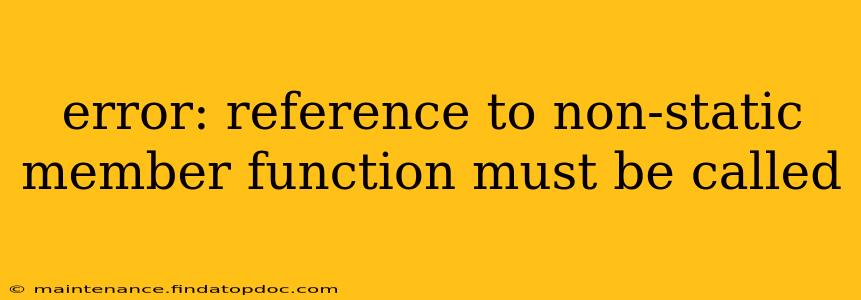error: reference to non-static member function must be called
This error message, "reference to non-static member function must be called," is a common one encountered in C++ programming. It arises when you attempt to call a non-static member function (a method belonging to a class) without using an object of that class. Let's break down why this happens and how to fix it.
Understanding Static vs. Non-Static Member Functions
In C++, member functions are associated with a class. They operate on the data (member variables) within a specific object of that class. There are two types:
-
Non-static member functions: These functions operate on the specific instance of the class (the object). They have access to and can modify the data of that particular object. You must call them using an object.
-
Static member functions: These functions belong to the class itself, not to a specific object. They don't have access to the non-static member variables of the class. You can call them directly using the class name.
The Root of the Error
The compiler throws the "reference to non-static member function must be called" error because you're trying to treat a non-static member function like a static one. You're essentially trying to use it without specifying which object's data it should manipulate.
Example and Solution
Let's illustrate with a simple example:
#include <iostream>
class MyClass {
public:
void myFunction() {
std::cout << "Hello from myFunction!" << std::endl;
}
};
int main() {
// Incorrect: Trying to call myFunction() directly without an object
//MyClass::myFunction(); // This will cause the error!
// Correct: Create an object and call myFunction() using that object
MyClass myObject;
myObject.myFunction();
return 0;
}
In the commented-out line, MyClass::myFunction();, we directly call myFunction() using the class name. Because myFunction() is a non-static member function, this is incorrect and generates the error. The corrected code creates an object (myObject) of the MyClass and then calls myFunction() using the object's dot operator (.).
When to Use Static Member Functions
Static member functions are useful when you need a function that operates independently of any specific object. For example, a function that counts the number of objects created or performs some utility task related to the class as a whole.
#include <iostream>
class MyClass {
public:
static int objectCount;
MyClass() { objectCount++; }
static void printObjectCount() {
std::cout << "Number of objects: " << objectCount << std::endl;
}
};
int MyClass::objectCount = 0; // Initialize static member variable
int main() {
MyClass obj1, obj2, obj3;
MyClass::printObjectCount(); // Correct: Calling a static member function
return 0;
}
Here, printObjectCount() is a static function and can be called directly using the class name. objectCount is a static member variable, tracking the number of objects.
Debugging Tips
-
Identify the non-static function: The error message usually indicates the specific function causing the problem.
-
Check function declaration: Ensure the function is not declared as
static. -
Create an object: Before calling the non-static member function, create an object of the class using
ClassName objectName;. -
Use the dot operator: Call the function using the object followed by the dot operator:
objectName.functionName();.
By understanding the difference between static and non-static member functions and following these guidelines, you can resolve the "reference to non-static member function must be called" error effectively.
